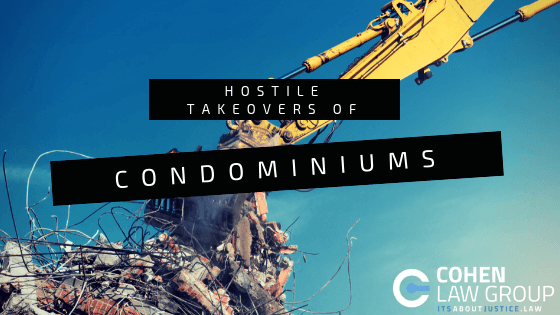Hostile Takeovers of Condominiums
By Robert “Bobby” Parsons, Esq.
In response to the proliferation of distressed and unsustainable condominium projects throughout the state, the Florida Legislature in 2007 amended Fla. Stat. Section 718.117.
Under the old law, 100% of unit owners were required for approval of any termination. It was very hard for owners of an old condominium to terminate it even if it was the smart thing to do.
The legislative findings of the 2007 revision stated, “in some circumstances, the continued enforcement of those covenants may create economic waste and areas of disrepair which threaten the safety and welfare of the public or cause obsolescence of the property for its intended use and thereby lower property tax values.”
The statutory revision reduced the approval threshold to 80 percent of the unit owners as long as no more than 10 percent of the unit owners objected to the plan in writing.
Under the 2007 Statute, it was then easier for condo owners to gather together and terminate the condominium.
However, it eventually led to abuse by developers.
As the condominium recession in Florida grew under the 2007 revision, investors sensed an opportunity to acquire condominium units at historically low, distressed prices, and many began to acquire all of the remaining unsold units in a distressed condominium — a bulk purchase — and then added to their investment by purchasing additional individual units.
Unhappy condo owners were pressured to sell their condos. Sometimes, after they had done so, they still had to deal with deficiencies and leftover mortgage debt.
In 2015, Florida Governor Rick Scott sought to change the 2007 Termination Statute to better protect condo owners against being forced out of their homes via this law.
“The law appears to have negatively impacted a number of families throughout the state, leading to the loss of their homesteaded property, and in many instances, resulting in the financial burden of remaining mortgage debt after the sale of their condominium,” Scott wrote.
Florida Governor Rick Scott signed Senate Bill 1520 into law on June 16, 2017.
Senate Bill 1520 addresses the termination of condominiums in Florida and impacts the manner in which Florida condominiums may be terminated pursuant to Section 718.117, Florida Statutes.
Specifically, the legislation changes the termination procedure in the following manner:
FIRST: Instead of the termination trustee simply providing a certified copy of the recorded plan of termination to the Division of Florida Condominiums, Timeshares, and Mobile Homes (the “Division”) within 90 days of the plan’s effective date, the legislation now requires that the Division approve all plans of termination. The Division has 45 days from receipt of the plan to approve or reject the plan of termination based on procedural sufficiency.
SECOND: Previously, at least 80% of the total voting interests of the condominium must approve the plan of termination and if 10% or more of the total voting interests of the condominium rejected the plan of termination by negative vote or by providing written objections, the plan of termination could not proceed. This legislation now only requires 5% or more of the total voting interests of the condominium to reject the termination.
THIRD: There is an increase the amount of time that a plan of termination may be reconsidered for a vote if the voting interests did not approve the plan of termination. Now, a subsequent plan of termination may not be considered for 24 months (increased from 18 months) after the date it was previously rejected.
FOURTH: Previously, if an owner purchased their unit from the developer and such owner rejected the plan of termination though it was otherwise approved, such owner had to be compensated at least the fair market value of the unit but no less than amount such owner paid for the unit. Now, this protection is in place for any owner who has homesteaded their property no matter from whom such owner purchased the unit.
The new statutory provisions regarding terminations became effective July 1, 2017.
This is all well and good; however, developers have other methods to construct hostile takeovers of condominium associations. One such method involves a rarely-discussed Equitable Relief section of the Condominium Statutes.
”In the event of substantial damage to or destruction of all or a substantial part of the condominium property, and if the property is not repaired, reconstructed, or rebuilt within a reasonable period of time, any unit owner may petition a court for equitable relief, which may include a termination of the condominium and a partition,” Section 718.118, Florida Statutes.
One such developer has utilized this tactic to try to terminate a condominium in Florida by filing an action for equitable relief seeking termination of a condominium pursuant to Section 718.118, Florida Statutes.
The developer claims court ordered termination would be equitable in order to help mitigate losses to the owners, to unencumbered the desirable property so that it can be redeveloped and returned to viability for the benefit of future residents, guests and the area.
The condominium in question concerns a property built in 1970s.
This was prior to current Federal, State, and local Flood Regulations and the current Florida Building Code. The property began to fall into disrepair in the early 2000s.
Litigation over the lack of maintenance, operation and other alleged failures, coupled with further deterioration, led to the condominium association’s bankruptcy with over $14 million in claimed debts.
The property then closed and all inhabitants vacated in 2009 due to its inoperability and disrepair.
On October 16, 2017, further decay ultimately led to the city issuing a “Notice of Unfit and Unsafe Structures and Order to Repair or Demolish Structures,” giving the condo owners 30 days to cure.
On May 31, 2018, the city issued an “Emergency Condemnation Order and Notice of Intent to Demolish.”
After an unsuccessful challenge to the demolition order, the demolition of the entire property commenced on July 26, 2018. Interestingly, the developer has offered to pay the entire cost of the demolition.
Throughout this entire period, multiple redevelopment proposals were presented to the condo owners, but none of the proposals were accepted with sufficient 80% majority to permit a voluntary termination of the condominium pursuant to Section 718.117, Florida Statutes.
The equitable termination sought by the developer under Section 718.118, Florida Statutes would allow the developer to sidestep the 80% majority vote, wresting control of the property away from the condo owners.
The condo owners have moved to dismiss the developer’s equitable relief action, claiming the percentage requirements of Section 718.117, Florida Statutes control over the equitable relief of Section 718.118, Florida Statutes, among other arguments.
The case is still pending, and the city requires the developer to have 100% ownership of the units before it can develop the property.
However, one has to ask, ownership of what?
Should the condo owners prevail in their challenge to the equitable termination, what will they be left owning?
The property will have long since been razed to the ground by the time the equitable termination of the condominium is decided by the court. Should the developer be successful in its equitable termination, how will valuation of the forced sale be handled? Should the condo owners prevail in their challenge to the equitable termination, what will they be left owning?
Section 718.117, Florida Statutes controls sales of condominiums within the context of voluntary termination of a condominium pursuant to the appropriate majority vote. It requires, “non-bulk owners to be compensated at least 100% of the fair market value of their units. The fair market value … shall be determined by an independent appraiser selected by the termination trustee.”
In most cases, “the fair market value shall be at least the original purchase price paid for the unit. The term ‘fair market value’ means the price of a unit that a seller is willing to accept and a buyer is willing to pay on the open market in an arms-length transaction based on similar units sold in other condominiums, including units sold in bulk purchases but excluding units sold at wholesale or distressed prices.”
How this provision applies to units that no longer exist is an interesting question, especially after considering the prohibition against considering “distressed” properties in the appraisal of properties that are clearly distressed themselves.

Robert “Bobby” Parsons, Esq.
DISCLAIMER: This website is for informational purposes only and does not provide legal advice. Please do not act or refrain from acting based on anything you read on this site. Using this site or communicating with Cohen Law Group through this site does not form an attorney/client relationship. This site is legal advertising. Please review the full disclaimer for more information by clicking here.

